Dive right into the labyrinth of SEO for plumbers, where digital footprints leave a lasting impression on your business. In this comprehensive guide, we’ll unpack strategies to give your plumbing services the spotlight they deserve—sans jargon, straight to the point. 💡
- On-Page SEO Essentials: The nuts and bolts of metadata and keyword-rich content
- Off-Page SEO Mechanics: Building a web of high-quality backlinks
- Local SEO: Mastering Google My Business for local visibility
- Technical SEO: Site architecture, mobile optimization, and page speed
Tired of a sluggish website with minimal conversions? Complement your SEO efforts with the Plerdy tool—an analytics powerhouse for CRO & UX. With Plerdy, analyze user behavior, conduct heatmaps, and refine website navigation for a seamless user journey that keeps the cash register ringing. 🛠️💰

Take the plunge, roll up your sleeves, and let’s refine your online plumbing landscape with SEO strategies that actually work. No fluff, only the tactics you need for skyrocketing visibility and customer engagement. Ready, set, optimize! 🚀
What is SEO
In the plumbing industry, a strong online footprint could be the difference between a business that thrives and one that barely survives. This is where SEO—Search Engine Optimization—comes into play. Focused on enhancing your website’s visibility on search engines like Google, SEO aims to boost your website’s ranking for specific keywords related to plumbing services. Higher site rankings mean more clicks, which boosts client engagement and purchases.
- Hyper-Local Targeting: With SEO, you can zero in on local areas where you provide services. Imagine your business showing up when someone types “emergency plumber in [Your City].”
- Authority Building: When you offer valuable content like “How to Prevent Pipe Freezing” or “Top Signs of a Sewage Backup,” you position your plumbing business as an industry authority. Over time, this trust converts website visitors into lifelong clients.
- Conversion Optimization: Through strategic website layout and compelling calls-to-action, SEO helps transform casual visitors into paying customers, ensuring that your online platform becomes a consistent revenue stream.
SEO extends its reach into various facets of your online strategy. The optimization starts right from the website architecture—ensuring quick load times and mobile compatibility—to the incorporation of meta descriptions and title tags tailored to plumbing-related keywords. It also encompasses off-page elements like backlinks and social signals that endorse your website’s credibility and relevance.
SEO isn’t a one-time gimmick; it’s an ongoing commitment. Regular updates, monitoring performance metrics, and tweaking strategies are par for the course. By investing in SEO, you’re not merely boosting website traffic; you’re enhancing brand visibility, customer loyalty, and revenue streams, shaping a holistic digital footprint for your plumbing business. With SEO in your toolkit, stagnation takes a backseat, making room for sustainable growth and industry leadership.
Why SEO Matters for Plumbers

In the plumbing sector, nothing siphons off business opportunities like invisibility in online searches. SEO—Search Engine Optimization—plays a pivotal role in reversing this situation, becoming the linchpin for boosting visibility, credibility, and revenue for your plumbing service. Let’s delve into why SEO resonates so emphatically in the plumbing industry.
- Capture High-Intent Traffic: Plumbing issues are often urgent. When someone’s basement floods, they’ll frantically search for a solution online. SEO ensures you show up in these high-stake moments, essentially capturing leads that are ready to convert.
- Tailored Local Targeting: Traditional advertising casts a wide net but catches very few. With SEO, you can hone in on specific localities, ensuring you’re the go-to plumber for areas you actually service.
- Competitive Edge: Several plumbers might operate in your vicinity. SEO makes sure you don’t just blend into the crowd but actually stand out, capturing the lion’s share of business opportunities.
The impact of SEO on your plumbing service extends far beyond mere online rankings. It builds up a repository of content that’s not just SEO-friendly but also valuable to potential customers. Think guides on tackling minor leaks or navigating the maze of water heater choices. Such resources not only get you organic traffic but also position you as an authority in the plumbing field.
Moreover, SEO optimizes the user experience on your website. The quick loading times, easy navigation, and mobile responsiveness aren’t just niceties—they’re necessities. These elements not only please the search engine algorithms but also hold the attention of prospective clients who land on your page.
SEO isn’t a sprint; it’s a marathon. It calls for regular audits, adaptability, and proactive strategy refinement. In a sector as competitive and localized as plumbing, these aren’t optional add-ons but essential prerequisites for sustained growth. In the digital age, SEO for plumbers isn’t an adjunct—it’s the nucleus around which your entire online business strategy orbits.
List of Best SEO Tips for Plumbers
The compilation of ‘Best SEO Tips for Plumbers’ is like gold—it’s full with gems that can boost any plumbing business’s search engine rankings. This isn’t just a trickle-down of generic SEO advice; it’s a tailored guide that taps directly into the unique digital plumbing needs, so to speak. If you’re looking to unclog the bottleneck in your online visibility and let the leads flow, this list is your go-to toolkit.
Understanding SEO Basics
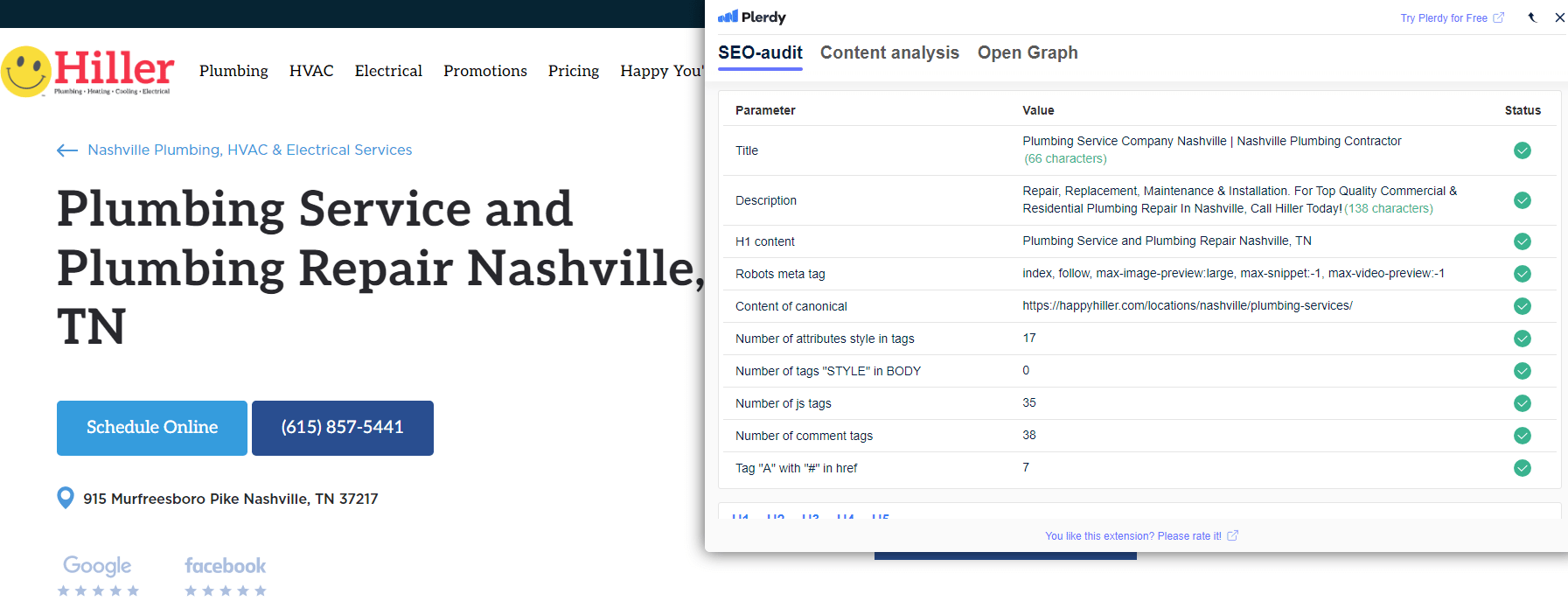
Decoding the SEO labyrinth might seem daunting, but once you get the hang of the basics, it’s more akin to aligning pipes for a plumbing setup. In essence, SEO involves a trio of elements—on-page, off-page, and technical—that function in unison to improve your website’s standing in search engine rankings. These elements are crucial touchpoints for any plumbing service aiming to make waves in the digital sphere.
- On-Page SEO Elements: This covers everything present on your website—content, title tags, meta descriptions, and more. Let’s say you’ve crafted an in-depth guide on “Choosing the Right Water Heater.” On-page SEO ensures that this guide features the relevant plumbing-specific keywords, so it gains the visibility it deserves.
- Off-Page SEO Elements: These are factors outside of your website that impact its reputation and ranking. Off-page SEO includes backlinks from reputable sites. If a popular home improvement blog links to your article about “Emergency Plumbing Solutions,” it boosts your site’s credibility and ranking.
- Technical SEO Aspects: Speed, mobile compatibility, and secure connections come under this umbrella. For instance, if your plumbing service website takes too long to load, prospective clients will bounce off and opt for a competitor with a faster site.
Incorporating SEO basics starts with meticulously optimizing every page on your site. Spice up your service descriptions with targeted keywords, but avoid overstuffing; search engines consider this spammy. To attract users, title tags and meta descriptions should include “professional plumber” and “24/7 plumbing service”. It’s about finding the sweet spot between search engine algorithms and human engagement.
Off-page SEO involves fostering relationships with industry blogs, local businesses, and other platforms where a backlink to your plumbing service would be valuable. Meanwhile, for technical SEO, you’ll need to pore over website analytics to identify bottlenecks—be it sluggish load times or bounce rates—and address them promptly.
In the vast ocean of digital competition, SEO serves as your compass, steering your plumbing service towards unparalleled visibility and customer conversion. It’s not merely about algorithms but about crafting an unparalleled user experience that turns website visits into confirmed appointments.
Local SEO: A Must for Plumbers
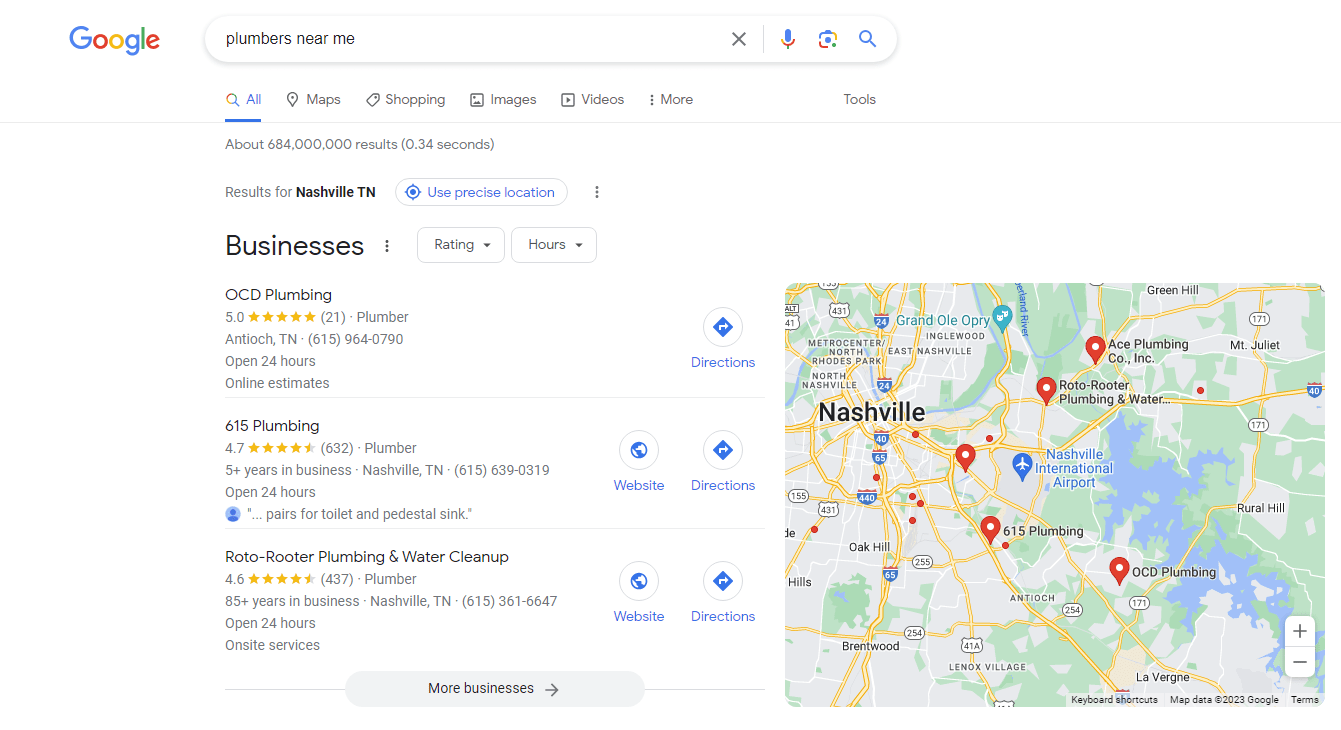
Local SEO isn’t just an upgrade for your plumbing business; it’s a necessity. It elevates your brand by optimizing your online presence for a specific geographical location—essentially, turning your service into the local go-to choice for anything plumbing-related. While general SEO propels your website’s global visibility, local SEO hones that focus, aiming it like a precision laser to attract customers in your immediate service areas.
- Google My Business (GMB): Claiming and optimizing your GMB profile is a cornerstone of local SEO. Ensure your business information—address, hours, phone number—is accurate and up-to-date. Google uses this data to feature your service in local searches and on Google Maps.
- Local Keywords: Incorporate location-specific phrases into your website content. Instead of generic terms like ‘reliable plumber’, use ‘reliable plumber in [Your City]’ to boost relevance and rankings in local searches.
- Customer Reviews and Ratings: Positive testimonials on platforms like Yelp not only enhance your reputation but also influence how you rank locally. Encourage satisfied clients to leave reviews detailing their positive experiences with your service.
Harnessing the power of local SEO involves a multi-pronged approach. First, dive into keyword research, identifying phrases that locals use when seeking plumbing services. This informs your content strategy, enabling you to create hyper-focused articles, blog posts, and service descriptions. Remember, it’s not about keyword stuffing but rather about natural integration of these terms to provide value to your readers.
Secondly, fortify your off-page SEO game by engaging in local partnerships. Sponsor a local event or collaborate with neighboring businesses to build a robust backlink profile rooted in your community. This not only increases your site’s trustworthiness but also amplifies its relevance in local searches.
Finally, never overlook the impact of social signals. Active social media channels featuring location-specific posts and customer interactions can significantly elevate your local SEO standings. Use Facebook and Instagram to promote your services and customer successes.
Local SEO isn’t just another checkbox on your digital marketing to-do list. It’s the linchpin that connects your plumbing business to your community, ensuring you’re the first name people think of when faced with a leaky faucet or a clogged drain.
Keyword Research for Plumbers
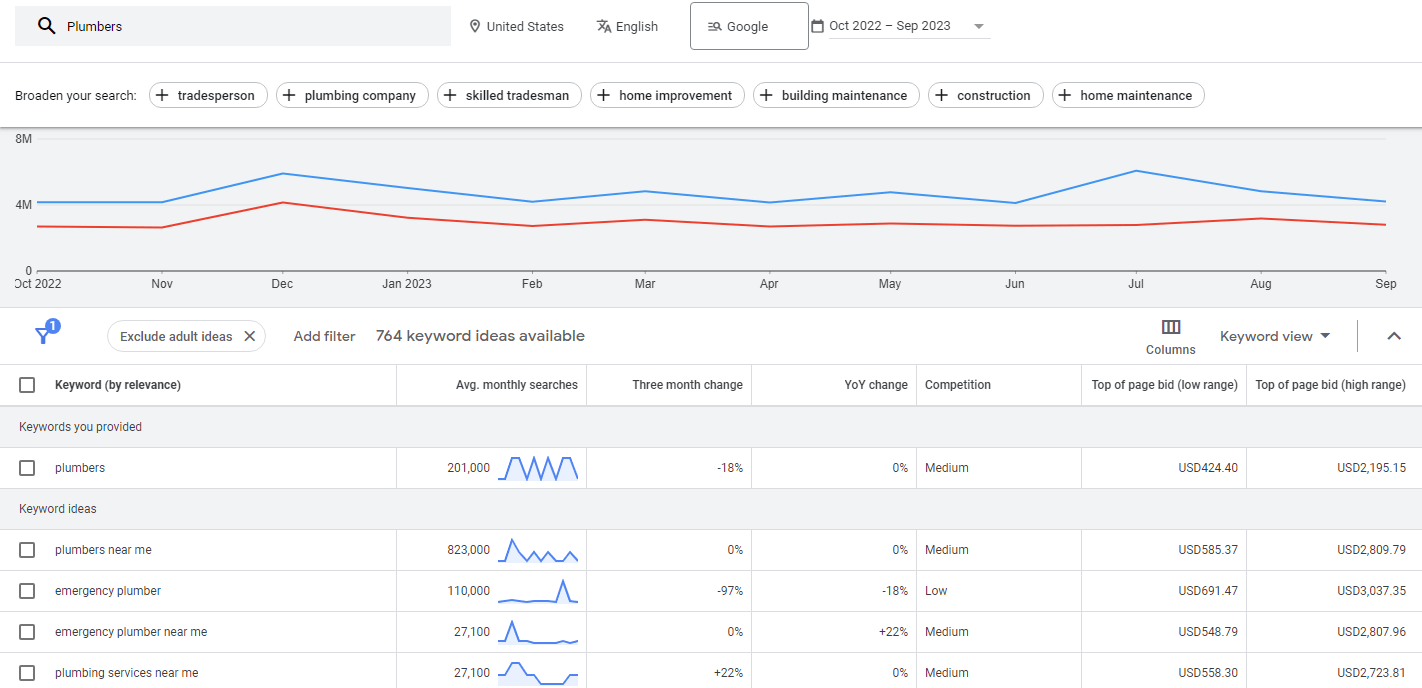
Keyword research underpins your plumbing service’s SEO strategy. When done effectively, it filters out the noise so you can focus on terms that resonate with your target demographic, improve organic traffic to your website, and convert visitors into purchases. For a plumbing business keen on scaling its digital footprint, this exercise is invaluable.
- Long-Tail Keywords: Instead of aiming for broad terms like ‘plumber,’ focus on longer, more specific phrases like ’emergency leak repair in [Your City].’ These have a lower competition rate and a higher likelihood of attracting people in immediate need of your services.
- Geographical Modifiers: Use the names of the cities or neighborhoods where your service operates. Phrases like ‘drain cleaning service in [Your Area]’ make you more relevant in local search outcomes.
- Service-Specific Terms: Differentiate your firm by targeting keywords like ‘water heater installation’ or’sewer line repair.’
Embarking on keyword research involves diving into multiple tools and platforms that offer insights into search patterns. Google Keyword Planner, SEMrush, and Ahrefs are some of the go-to resources for this exercise. Analyze not just search volume but also keyword difficulty to gain a rounded view of your opportunities.
Integrate the harvested keywords into various parts of your website—page titles, meta descriptions, content, and even image tags. But remember, your ultimate goal isn’t just ranking; it’s providing value. Build your content around these keywords in a manner that answers questions and solves problems. For instance, if ‘sump pump maintenance’ is a keyword, generate a detailed blog post explaining how homeowners can keep their sump pumps in top condition.
Don’t just set it and forget it; keyword trends change, and your competitors adjust their strategies. Consistently revisit your research, refresh outdated content, and maintain an eye on your rankings.
Done right, keyword research isn’t merely an SEO function; it’s a customer acquisition strategy. When you focus on the right terms, your website doesn’t just attract more traffic—it pulls in the kind of audience that’s actively seeking your plumbing expertise. It essentially turns your website into a highly efficient, 24/7 sales rep.
On-Page SEO Strategies for Plumbers
On-page SEO isn’t merely a box to tick; it’s a potent tool for plumbers to turn website visits into service calls. This approach to SEO revolves around enhancing individual webpage elements so that they rank higher and earn more relevant traffic. Here’s how you can supercharge your on-page SEO efforts.
- Strategic Keyword Placement: Insert your keywords into crucial spots like the title tag, H1, and throughout your content. If you offer 24/7 emergency plumbing, make sure you lace that keyphrase into these critical areas.
- Meta SEO Descriptions: Craft compelling meta descriptions that entice users to click. “Expert plumber offering drain cleaning and water heater repairs—get a free quote today!” could be a winner.
- Image Optimization: Before submitting photos, rename them to “Bathroom-Faucet-Repair” and use alt text for search engines. Optimized images load faster, providing a better user experience.
- Internal Linking: Build a network of internal links to guide users to valuable, related content. Point visitors to your sink repair service website from a blog post.
- Content Length and Quality: Long-form, informative content not only ranks higher but also positions you as an industry authority. If you have a ‘how-to’ section on pipe maintenance, make sure it’s thorough, easy to follow, and exceeds the average content length in your niche.
Ramp up your user experience by breaking down blog posts into shorter paragraphs, using bullet points for easy reading, and incorporating media like videos or infographics. Image compression, browser caching, and code optimization speed up your site. A slow website can kill conversions, so don’t slack off on site speed.
Implementing schema markup can also offer a robust local SEO boost. This piece of code helps search engines understand your business locale and offerings better. Google My Business integration is another tactic not to be glossed over. Update your profile, encourage reviews, and ensure your service area is accurately portrayed.
Implement these on-page SEO strategies, and you’ll not only climb the rankings but also increase the probability of those coveted clicks morphing into service calls. Each visitor you attract is a potential customer, and with on-page optimization, you’re essentially rolling out the red carpet for them.
Off-Page SEO Techniques
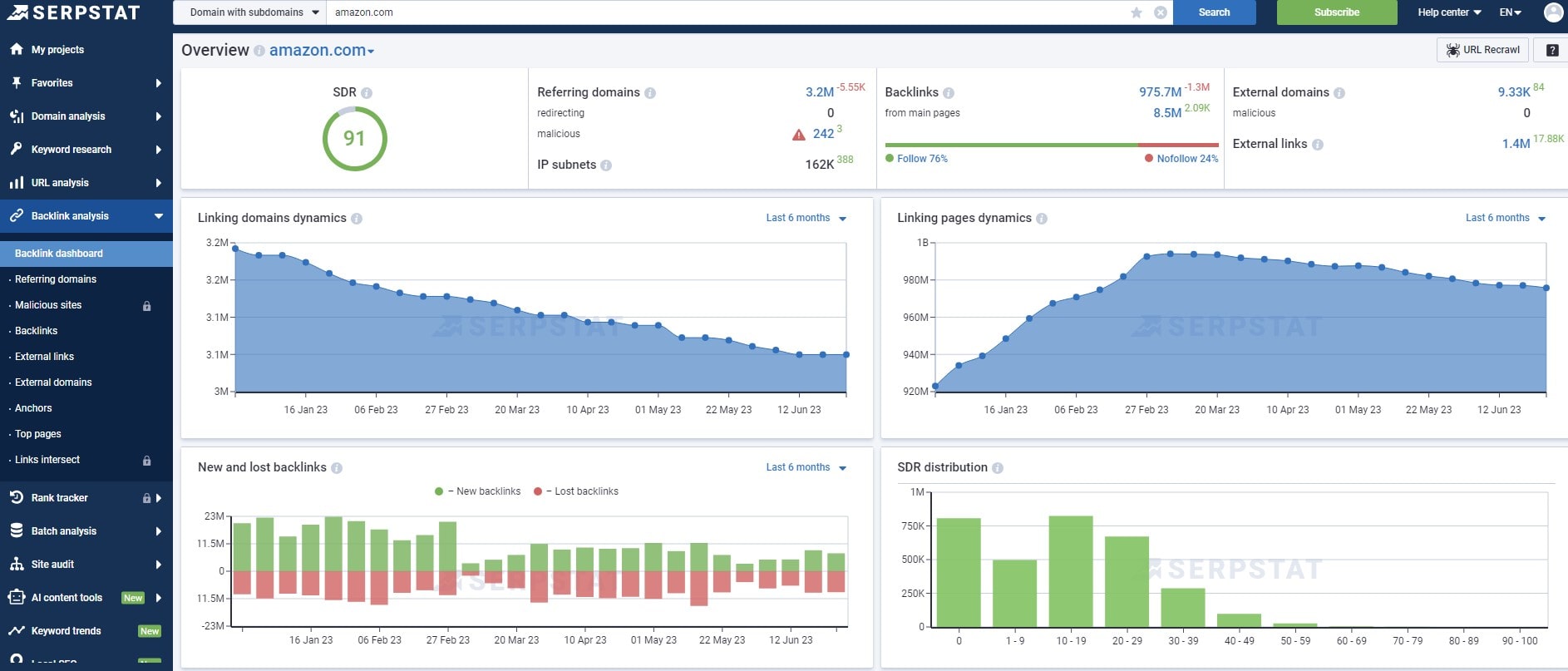
Off-page SEO elevates your plumbing service from just another name in the list to a force to be reckoned with. If on-page strategies tune up your website, off-page techniques rev up your entire online brand, making your plumbing service the first choice in search engine rankings and user preferences.
- Link Building: Get quality backlinks from reputable sites in the home improvement or plumbing sector. For instance, a testimonial from a local construction firm about your plumbing services can generate not only a quality backlink but also social proof.
- Social Media Engagement: Stay active on social media platforms like Facebook, Twitter, and Instagram. Share tips on pipe maintenance, water conservation, or bathroom renovations, linking back to comprehensive articles on your website. Consistent social activity indirectly boosts SEO by increasing site traffic and brand mentions.
- Google My Business: An updated and well-managed Google My Business profile can propel your local SEO efforts. Make sure to garner positive reviews, post timely updates, and reply to queries to maintain an authoritative image.
- Local Directories: List your plumbing service on local online directories. A feature in a “Best Plumbers in [Your City]” article could do wonders for your off-page SEO.
- Influencer Outreach: Partner with bloggers or influencers in the home improvement sector. They can review your plumbing service or feature it in a “how-to” video, which will link back to your website.
- Content Marketing: Pump out stellar content that other websites will want to link to. Consider an eBook on “The Ultimate Guide to Home Plumbing Maintenance” to showcase your expertise.
Keep track of your backlinks, brand mentions, and other metrics to measure the efficacy of your off-page SEO strategies. Utilize tools that offer insights into your competitors’ backlinks, enabling you to aim for those links as well. Above all, maintain a consistent NAP (Name, Address, Phone Number) profile across all platforms for local SEO impact.
By syncing your off-page SEO efforts with your on-page strategies, you create a seamless, potent brand narrative. Customers will not only find your plumbing service but will also see it as the go-to solution for their needs.
Technical SEO Essentials
In the plumbing industry, a wrench and a pipe cutter aren’t your only tools. Technical SEO also sits in your toolbox, indispensable for plumbing your way to the top of search engine rankings. Imagine you’ve built a stellar website for your plumbing service, packed with compelling content and customer testimonials. If you overlook technical SEO, you’re essentially putting up a billboard in a desert.
- Page Speed: Google values rapid load times, and so do potential clients. Optimize your image sizes, minify CSS, and leverage browser caching. Consider that a one-second delay could result in a 7% reduction in conversions.
- Mobile Responsiveness: A site that doesn’t adapt to mobile devices isn’t just frustrating; it’s a conversion killer. Google also takes mobile-friendliness into account, so ensure your website scales seamlessly across devices.
- XML Sitemaps: An XML sitemap guides search engines through your website’s architecture, making it easier for them to index your pages. Especially in a large plumbing service site, an XML sitemap can speed up the crawling process.
- HTTPS: In the era of data breaches, security takes precedence. An HTTPS website not only protects client information but also earns brownie points with Google.
- Schema Markup: Implementing schema markup can provide search engines with more context about your service, such as reviews and services offered. This increased understanding can enhance your snippet’s visibility in search results, enticing clicks with star ratings or price ranges.
- Canonical Tags: When you have similar material on numerous sites, use canonical tags to tell search engines which version to index. This avoids the risk of duplicate content penalties.
- Robots.txt Files: These files guide search engine crawlers on which pages to crawl or ignore on your website. Well-configured robots.txt files help crawlers prioritize critical plumbing service pages.
By attending to these technical SEO essentials, you knit a digital safety net that supports your on-page and off-page efforts. The end result: a well-optimized plumbing service website that not only ranks but also turns clicks into customers. Dive into your site’s backend today to tune these technical elements, synchronizing your website’s performance with the quality of your plumbing services.
Monitoring and Measuring SEO Success
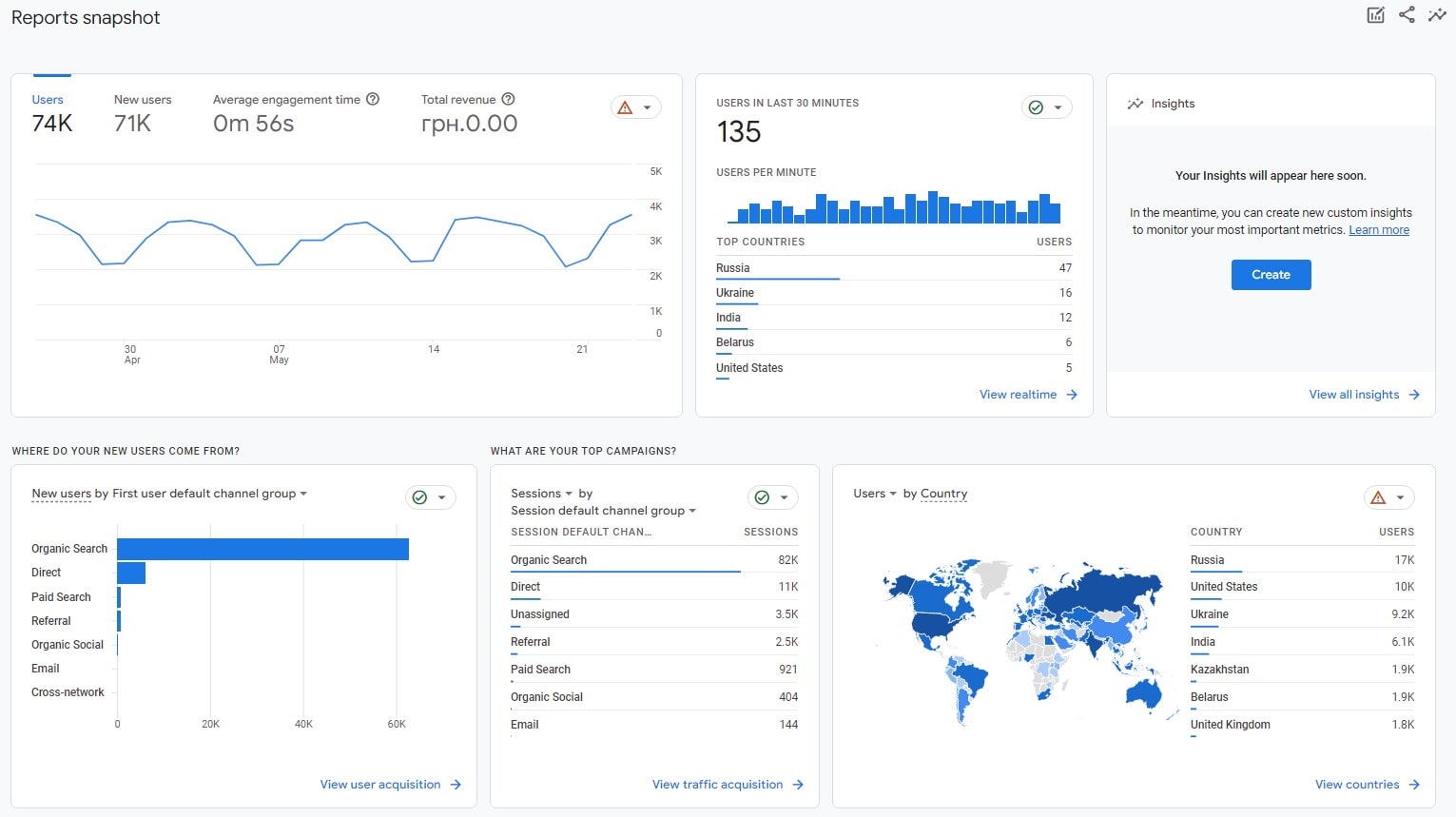
Success in the plumbing industry is no longer just about wrenches and customer service; it’s also about how effectively you can measure and monitor your digital efforts. A robust SEO strategy is a potent tool in a plumber’s arsenal. Still, without proper metrics and analytics, you’re driving without a map.
- Keyword Rankings: Keeping tabs on where your plumbing service shows up for key phrases can offer critical insights. Shifts in rankings can alert you to trends or signal the need for strategy adjustments.
- Organic Traffic: It’s not just about clicks; it’s about qualified leads. Pay attention to user behavior, including the time they spend on your service pages, the route they take through your website, and the actions they perform.
- Conversion Rate: This golden metric ties directly into your ROI. By tracking how many website visitors become customers, you can assess the real-world effectiveness of your SEO strategy for your plumbing service.
- Backlink Profile: A plumbing website isn’t an island. A healthy collection of incoming links from reputable sources amplifies your site’s authority, boosting its standing in search engine results. Regularly audit your backlink profile to weed out low-quality links that could weigh down your rankings.
- Local SEO Metrics: Specifically for plumbers, local visibility is paramount. Track your Google My Business listing’s performance metrics, like clicks-to-call and driving directions, to gauge local engagement.
- User Experience: Metrics like bounce rate and page load time serve as indicators of user satisfaction. High bounce rates could indicate irrelevant content, while slow load times might signify a need for website optimization.
- Cost-Per-Click (CPC) vs. Organic Reach: Monitor your CPC for paid ads and measure it against the organic reach. A lowering CPC coupled with an increasing organic reach suggests your SEO efforts are paying off, making your plumbing service more findable without needing to pony up for ads.
By keeping your finger on the pulse of these metrics, you can continually refine your strategy to ensure your plumbing services aren’t just easily found, but also convert browsers into loyal customers. Dig into your analytics dashboard to dive deep into these KPIs, making data-backed decisions that turbocharge your digital performance.
SEO Pitfalls to Avoid
In the fiercely competitive plumbing sector, SEO missteps can drive your service into the digital abyss, turning your website into a ghost town. To avoid this downward spiral, steer clear of the following pitfalls that could cripple your online performance.
- Keyword Stuffing: Flooding your plumbing website with keywords doesn’t fool search engines, but it does alienate users. A better approach is to incorporate keywords naturally, within genuinely valuable content.
- Ignoring Local SEO: Failing to optimize for local search is like neglecting the neighbors while inviting strangers to your party. Ensure you have an updated Google My Business listing and invest in local keywords.
- Duplicate Content: Copy-pasting material across multiple pages can stifle your SEO. Search engines can demote your website for this error, diminishing the visibility of your plumbing service.
- Neglecting Mobile Experience: In today’s mobile-centric environment, an unresponsive design can alienate a massive chunk of potential customers. Your website should be as fluid as water, catering to desktop and mobile users alike.
- Poor Internal Linking: Well-executed internal linking elevates your site’s usability and SEO. Ignoring this tactic leaves significant benefits on the table, impacting your website’s crawlability and user navigation.
- Forsaking Analytics: Flying blind by not leveraging analytics tools is a recipe for disaster. Data-driven insights are crucial for steering your SEO strategy in the right direction.
- Skimping on Content Quality: Thin or poor-quality content won’t help your plumbing website rise to the top. Invest in valuable, in-depth information to stand out among competitors and offer true value to your visitors.
- Lax Backlink Strategy: Recklessly piling up low-quality backlinks can trigger search engine penalties. Prioritize partnerships with reputable sites within your industry and related niches for a stronger backlink profile.
- Ignoring Page Load Speed: The faster your service pages load, the better the user experience. Lagging speeds can send potential customers scurrying to competitors.
When it comes to plumbing SEO, cutting corners will invariably catch up with you. Consistency, quality, and a keen eye for detail pave the road to lasting digital success. The objective is simple: make your plumbing service the go-to option in the digital universe, one click at a time.
Hiring an SEO Agency vs. DIY SEO
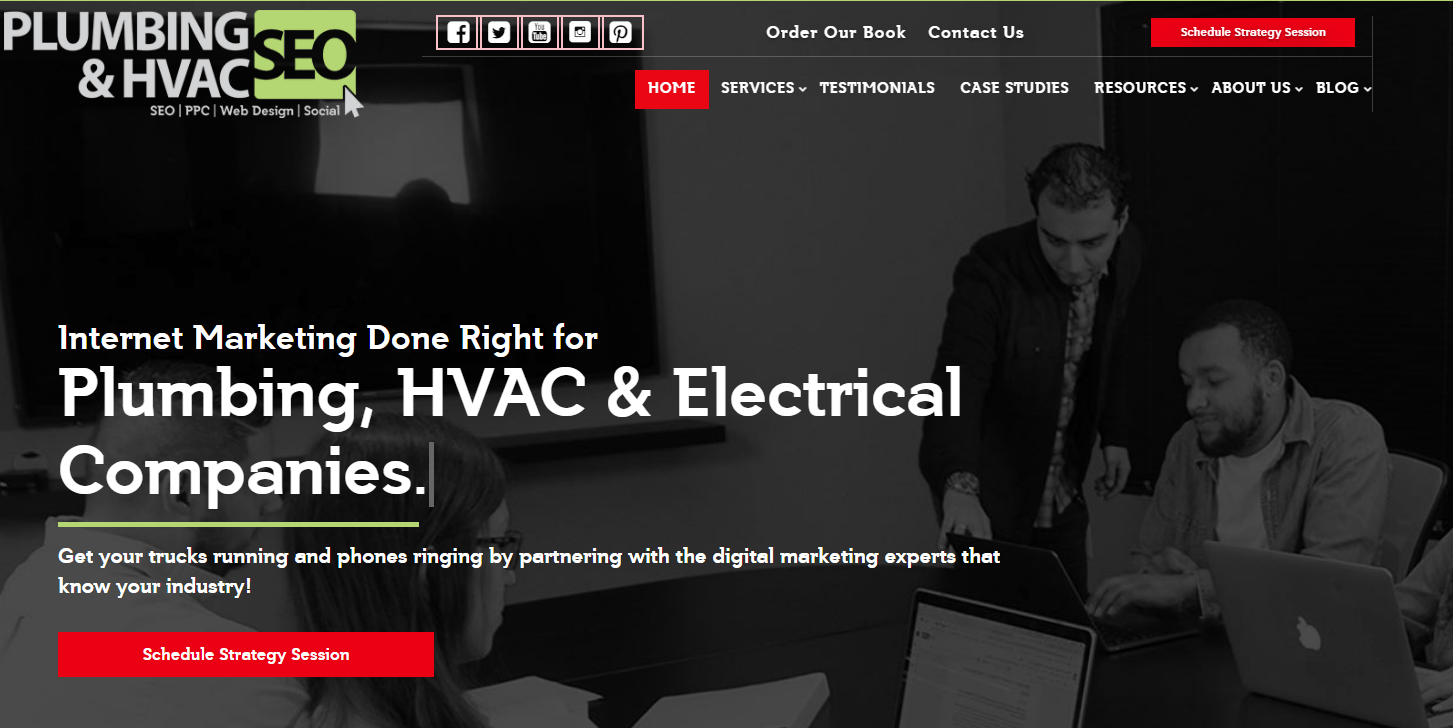
Trying to figure out plumbing SEO? The crossroads often present two paths: enlisting an SEO agency or diving into the DIY SEO waters yourself. Each option has its merits and pitfalls, demanding thoughtful deliberation. Let’s break it down.
Hiring an SEO Agency
- Expertise On Tap: Agencies breathe SEO. They’ve seen algorithm updates come and go. They understand the intricacies of backlinks, local search, and keyword targeting—valuable assets for a plumbing service.
- Time Savings: Time equals money, especially for plumbers. An agency can handle everything from strategy to execution, letting you focus on your core business.
- Cutting-Edge Tools: Agencies use premium analytics, keyword research tools, and reporting software that may be too expensive for a single business to invest in.
- Cost: Here’s the catch—quality SEO services don’t come cheap. Expect to part with a significant amount of your budget.
DIY SEO
- Cost-Effective: The most apparent benefit is cost. No need to earmark funds for agency fees; your investment is your time and perhaps some affordable software.
- Full Control: You dictate the pace and direction of your SEO endeavors. For a plumber who knows their local market inside out, this can be a considerable advantage.
- Learning Curve: Unless you’re already savvy with the intricacies of SEO, be prepared to set aside ample time to catch up. There are no shortcuts.
- Outdated Strategies: The risk of utilizing outdated or frowned-upon SEO methods is higher if you’re not continuously updated on best practices.
In a nutshell, if you’re a plumber with time constraints or an appetite for high-level strategies, an agency might be the best fit. They bring a concentrated dose of expertise and tools to pump up your website’s SEO metrics. On the flip side, if you have more time than money and are eager to get your hands dirty in the SEO arena, DIY could be your route. Either way, the objective remains unaltered: to optimize your plumbing service website for maximum visibility and conversions. Choose wisely.
Conclusion
Navigating the intricacies of SEO for plumbers doesn’t have to be a pipe dream. With the right strategies, your plumbing or HVAC company can unblock the full potential of the internet to create a steady flow of leads and revenue. Our guide has provided actionable steps and specific examples, so there’s no better time to get started on optimizing your digital campaigns. If you aim to explore deeper, tap into WebFX or Jobber’s treasure trove of tools that have been crafted over the years to meet the specific needs of the plumbing industry. For those plumbing companies that intend to dive deep into granular SEO topics like metadata, URL structuring, and location-based keywords, Plerdy tool SEO & UX analysis should be your next pit stop. This tool allows you to fine-tune your online strategies by providing comprehensive reports and actionable insights. Don’t just hear what we have to say, listen to other plumbing contractors who have shared their success stories. Now, don’t settle for a drip when you can unleash a torrent. Ready to take the plunge? Try Plerdy today and wave goodbye to obscurity. 🌊🛠️
